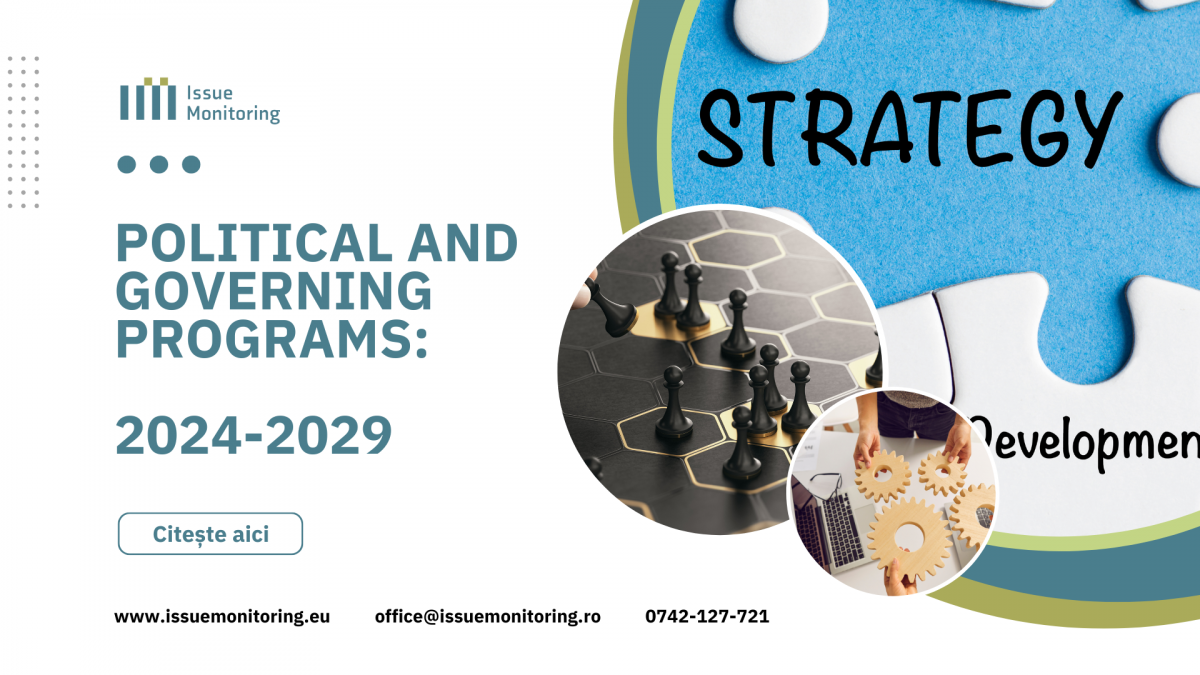
Article written by: Ana-Maria Anghel, Cezar Petrescu & Daniel Dumitru, Senior Public Policy Specialists @Issue Monitoring
This article analyzes the governance programs of Romania’s four major political parties—PNL, PSD, USR, and AUR—highlighting their proposed directions in taxation, labor market policies, infrastructure, healthcare, energy, education, and foreign policy. The main goal is to provide a comparative perspective on each party’s approach and evaluate the potential impact on Romania’s economic and social environment.
1. Taxation and Fiscal Policies
PNL: Fiscal Stability and Incentives for Employees
PNL supports maintaining the flat tax rate to encourage private investment and proposes limiting tax inspections to once per year. It also advocates for a €500,000 cap for microenterprises with a 1% tax rate, similar to PSD’s policy. A notable initiative includes distributing dividends as shares to employees to increase engagement and retention. The party also aims to reorganize fiscal institutions, promoting transparency and objective criteria for inspections.
PSD: Fiscal Stability and Support for Domestic Production
PSD guarantees a predictable tax system, maintaining current rates (10% on income, 16% on profit, and 19% VAT). The party prioritizes reducing the budget deficit by digitalizing the tax authority (ANAF), optimizing public expenditures, and supporting domestic production through investments and state aid. PSD promises to lower labor taxes and stabilize prices for essential goods such as food and energy.
USR: Deregulation and Support for SMEs
USR proposes completely eliminating taxes for certain salary categories and simplifying VAT collection by limiting it to the final seller. For SMEs, USR suggests reverting to the previous taxation system, reducing social contributions to a capped level, and removing restrictions on the number of microenterprises owned. The party champions a free-market economy, reducing fiscal burdens and curbing uncontrolled government spending.
AUR: Tax Reductions and Support for Families
AUR prioritizes stable fiscal legislation for 10 years and proposes a 2% turnover tax for small businesses. It also advocates for drastically reducing social contributions and raising the minimum wage without increasing taxes. The party supports families through tax exemptions and benefits for those returning to or residing in Romania. However, the sustainability of these measures is questionable, given the current budget deficit.
2. Labor Market
PNL: Economic Growth and Support for Private Pensions
PNL aims to increase the average net salary from €1,000 to €1,400 over the next four years, relying on investments and economic growth without enforcing minimum wage hikes through government mandates. It also supports strengthening the second pension pillar (Pillar II) by raising contributions to 6% and developing Pillars III and IV, which encourage diversification of retirement income and bolster the capital market.
PSD: Raising the Minimum Wage and Supporting Youth Employment
PSD promises a gross minimum wage of €1,300 by 2029, reduced taxes for low-income salaries, and a subsidy program for hiring young workers. Employers would receive a subsidy of 2,250 RON for each young employee hired for at least 18 months. Other initiatives include the Romania Professional Program, offering vouchers of up to €800 for professional retraining, and the integration of people with disabilities into the workforce through the START entrepreneurship program.
USR: Flexibility and Reduced Bureaucracy
USR advocates for greater labor flexibility by removing restrictions on part-time work and promoting fixed-term contracts. It also proposes outsourcing employment counseling services and offering tax benefits to employers collaborating with protected units, thereby encouraging the integration of people with disabilities. USR views deregulation as a solution to boost economic growth.
AUR: Higher Salaries and Profit Sharing
AUR proposes raising the average net salary to €2,000 within four years, gradually increasing the minimum wage to 5,000 RON, and providing tax exemptions for active retirees. The party supports mandatory dividend distribution to employees in companies with over 50 workers, promoting employee financial participation in profits. However, the sustainability of AUR’s ambitions remains a subject of concern.
3. Business Environment and Industry
PNL: Investments and Capital Market Development
PNL emphasizes the development of the capital market and supporting SMEs through the Investment and Development Bank. Initiatives include a public-private fund for startups, financing through the Bucharest Stock Exchange and pension funds, and financial education programs for entrepreneurs. In the industrial sector, PNL proposes state aid for technological modernization, energy efficiency, and emissions reduction. Additional measures include €150 million investments in manufacturing and international certifications in agriculture, IT, and healthcare.
PSD: Reindustrialization and Technology
PSD promotes reindustrialization through “economic patriotism,” investing in advanced technologies, defense, and the circular economy. Plans include €1 billion for decarbonizing metallurgy, €447 million for manufacturing, and €600 million for high-tech startups. Other priorities involve contributing to Ukraine’s reconstruction and developing drones and aircraft. PSD also supports dual technical education, allocating €400 million for STEM specialist training, and reducing regional disparities through subsidies.
USR: Research and Innovation
USR focuses on research, proposing tax incentives for R&D investments and clear performance indicators for projects. The party suggests introducing professional doctorates and career counseling services but does not include measures to support large industries. Their strategy aims to modernize the economy through innovation, although the absence of direct support for industrial sectors is a notable gap.
AUR: Economic Patriotism and National Resources
AUR advocates for reindustrialization and the use of natural resources. Policies include deregulation, support for defense industries, and mandatory listing of large companies. Proposals such as separating utility distribution from supply, temporary export bans, and prioritizing local production aim to strengthen domestic industries but may strain international trade relations. AUR’s proposed Sovereign Investment Fund seeks to manage resources and fund strategic investments, though a lack of details raises questions about its long-term sustainability.
4. Digitalization
PNL: Digital Transformation and Rural Inclusion
PNL integrates digitalization into its governance plans, focusing on digital infrastructure and modernized education. Measures include digital innovation platforms, support for SMEs through public-private investments, and expanding high-speed internet to rural areas. In education, PNL promotes digital tools, artificial intelligence, and digital resources for schools, aiming to reduce urban-rural disparities.
PSD: Practical Digitalization Without Comprehensive Digital Education
PSD prioritizes projects such as “Digitalization in Villages” and artificial intelligence hubs, investing in rural infrastructure and connecting the Romanian diaspora to digital services. While it allocates funds for STEM education and teacher training, it lacks an integrated plan for digital education. The party focuses more on transforming public administration and the economy through digitalization.
USR: Efficient Administration with a Minimalist Approach
USR proposes digitalizing public administration through interoperability and strict standards but provides few details on digital infrastructure or education. While it supports the use of AI and advanced technologies, its measures for basic digital skills and internet access are underdeveloped.
AUR: Limited Digitalization and Opposition to Digital Education
AUR promotes digital public services and interoperability but opposes digital education, citing the protection of autonomy and privacy. Its initiatives include integrating AI into administration and establishing ethical standards for digitalization, but the lack of detailed measures may hinder Romania’s progress in the digital domain.
5. Energy and Environment
PNL: Energy Independence and Sustainability
PNL prioritizes exploiting natural gas resources in the Black Sea, modernizing reactors 3 and 4 at Cernavodă, and expanding solar and wind energy projects. On environmental issues, the party proposes planting 60,000 hectares of forest by 2030 and waste management initiatives such as the Deposit-Return System and programs like Rabla. In agriculture, PNL supports modern irrigation systems for 1 million hectares by 2028 and the promotion of organic farming.
PSD: Energy Development and Reindustrialization
PSD supports modernizing Unit 1 at Cernavodă and expanding energy interconnections with Moldova. For the environment, the party plans to reforest 26,000 hectares and implement video monitoring systems for forests. In waste management, PSD aims to increase recycling rates and create 1,000 jobs in the waste industry. In agriculture, PSD promotes support for young farmers, reducing dependence on exports, and expanding irrigation systems powered by green energy.
USR: Clean Energy and Precision Agriculture
USR emphasizes market-based energy prices and the development of renewable energy sources, including hydrogen and geothermal. It proposes standardized recycling for waste management and tackling illegal logging through digital technologies. In agriculture, USR promotes precision irrigation solutions and supports small farmers through local gastronomic hubs.
AUR: Economic Nationalism and Resource Conservation
AUR advocates for the nationalization of strategic resources, temporary export bans, and the creation of a Sovereign Investment Fund. On environmental matters, it proposes reforesting 1 million hectares and protecting the Danube Delta, though the measures lack detail. In agriculture, AUR suggests logistical hubs and promoting organic products, but there is little focus on sustainability.
6. Transport
PNL: Connectivity and Multimodal Transport
PNL prioritizes the completion of major highways such as A3 and A8, along with new projects like A13 and A14, aiming to connect all county capitals to the rapid road network. The party supports multimodal projects, including the modernization of the Constanța port, railway corridors, and the Fast Danube project. In urban transport, PNL proposes metropolitan trains and electric trams to reduce traffic and emissions. A new terminal at Otopeni Airport is planned for 2028.
PSD: Infrastructure and Production Capabilities
PSD focuses on completing highways and modernizing railway and naval networks. Unlike PNL, the Social Democrats include measures to support the national industry by increasing the production capacity of infrastructure materials. Metropolitan transport systems are also a priority for PSD.
USR and AUR: Minimalist and Nationalist Approaches
USR emphasizes bypass roads and airport infrastructure but offers few details on multimodal transport. AUR proposes rapid connections through highways and high-speed rail lines, port development, and a new regional airport south of Bucharest, with multimodal integration.
7. Healthcare
PNL: Prevention and Modernization
PNL prioritizes the modernization of 50 major hospitals and the implementation of the National Cancer Plan, including prevention and screening programs for common diseases. The party advocates for health education, promoting a healthy lifestyle, and introducing optional health insurance for greater financial flexibility.
PSD: Digitalization and Pharmaceutical Production
PSD supports the construction of regional hospitals by 2028 and the digitalization of healthcare through electronic records and online services. The party promotes local pharmaceutical production with tax exemptions and ensures access to affordable medicines in rural areas. Additionally, PSD includes health education in schools and expands screening programs.
USR: Oncology and Digitalization
USR focuses on oncology, with early detection programs for cancer and reducing waiting times for access to new therapies. The party supports digitalization through electronic patient records and the development of a second healthcare insurance pillar to provide alternatives to the National Health Insurance House.
AUR: Infrastructure and Prevention
AUR proposes building hospitals and clinics, revitalizing the Cantacuzino Institute, and implementing a prevention program based on free medical tests and healthy nutrition. However, their measures remain vague and lack sufficient detail.
8. Social Perspectives
PNL: Inclusion and Affordable Housing
PNL proposes completing 5,000 rental housing units for young people and continuing programs like Prima Casă (First Home) and Noua Casă (New Home), alongside modernizing legislation to support social inclusion. The party aims to reduce poverty in 2,000 rural communities through integrated services and energy-efficient renovations. In education, PNL supports providing daily meals for students to reduce inequalities.
PSD: Expanded Social Support
PSD prioritizes social infrastructure in rural communities through programs like Minimum Living Standard and support for utility bills. Young people benefit from tax incentives and programs for education and housing, while vulnerable groups, including individuals with disabilities, gain access to improved services.
USR: Focus on Counseling and Infrastructure
USR supports building ANL (National Housing Agency) housing and proposes linking disability allowances to the minimum wage. Other measures include professional and psychological counseling for young people and establishing a national daycare program.
AUR: Family Policies and Large-Scale Housing
AUR proposes building 1 million affordable apartments over 10 years and supporting families through subsidies and tax exemptions. Their policies include involving the Romanian Orthodox Church in social services, marking a distinct approach compared to other parties.
9. Rule of Law
PNL: Transparency and Limited Modernization
PNL emphasizes judicial independence, anti-corruption, and transparency, but its proposals remain general, lacking concrete measures. Initiatives include modernizing courts and creating a “Civic Agora” to encourage citizen engagement, but there are no substantial reforms to strengthen judicial independence.
PSD: Procedural Efficiency and Business Support
PSD proposes specialized courts for commercial disputes, merit-based promotion of judges, and simplified legal procedures. While these measures improve accessibility and efficiency, they do not include major initiatives to enhance judicial independence.
USR: Deep and Constitutional Reforms
USR prioritizes fighting corruption, expanding the DNA’s competences, and reforming the Superior Council of Magistracy (CSM). Proposals include the “No Convicts in Public Office” initiative and a unicameral Parliament with 300 members. USR addresses systemic issues, promoting transparency and accountability.
AUR: Ambitious but Unrealistic Proposals
AUR suggests the direct election of judges and holding magistrates accountable for judicial errors, but these measures raise constitutional concerns. The party also proposes extensive administrative and judicial reforms, but the lack of detailed plans casts doubt on their feasibility.
10. Foreign Policy
PNL: Multilateralism and Strategic Partnerships
PNL supports multilateralism, strengthening ties with the EU, NATO, and the USA, joining the OECD, and expanding Romania’s influence in global markets. The party prioritizes Schengen integration and supports Ukraine, Moldova, and the Western Balkans on their European paths. PNL promotes security on NATO’s Eastern Flank, developing the Black Sea as a zone of stability, and deepening the partnership with the USA, particularly in energy and security sectors.
PSD: Traditional Alliances and Strategic Infrastructure
PSD focuses on strengthening relationships with traditional allies and regional initiatives like Rail2Sea and Via Carpathia. The party supports Moldova’s EU integration and proposes expanding strategic relations with countries in Europe and Asia.
USR: Democratic Values and Regional Security
USR advocates for policies rooted in international norms, supporting Ukraine and enhancing relationships with the USA, EU, and Indo-Pacific states. The party opposes authoritarianism from Russia and China and promotes regional cooperation for security.
AUR: National Sovereignty and the Diaspora
AUR supports European integration but prioritizes a Europe of nations. The party proposes reunification with Moldova and the establishment of an agency for the diaspora, emphasizing the Church’s central role in foreign policy. AUR promotes relations with Asia and nationalist economic initiatives.
Conclusion
The report highlights the diversity of strategies and priorities proposed by Romania’s four major political parties—PNL, PSD, USR, and AUR—for addressing the country’s economic, social, and political challenges. While there are shared goals, such as infrastructure development, digitalization, and strengthening international relations, ideological differences are evident in the details and orientations of their proposals.
PNL and PSD focus on concrete measures for modernization and economic growth but approach these goals differently: PNL emphasizes investments and competitiveness, while PSD prioritizes direct support for vulnerable groups and strengthening local industries. USR proposes structural reforms and policies centered on innovation and transparency, whereas AUR emphasizes a nationalist approach with a strong focus on sovereignty and traditions.
These proposals create a complex political landscape, where each party articulates its vision for Romania’s future. The political decisions that will be implemented depend on balancing electoral ambitions with economic feasibility, highlighting the importance of a balanced and inclusive approach to address the needs of Romanian society.
Our clients receive weekly and monthly analysis and summary reports across various fields: fiscal, pharmaceutical, digital, banking, energy, and more. If you’d like to join them, click here.


